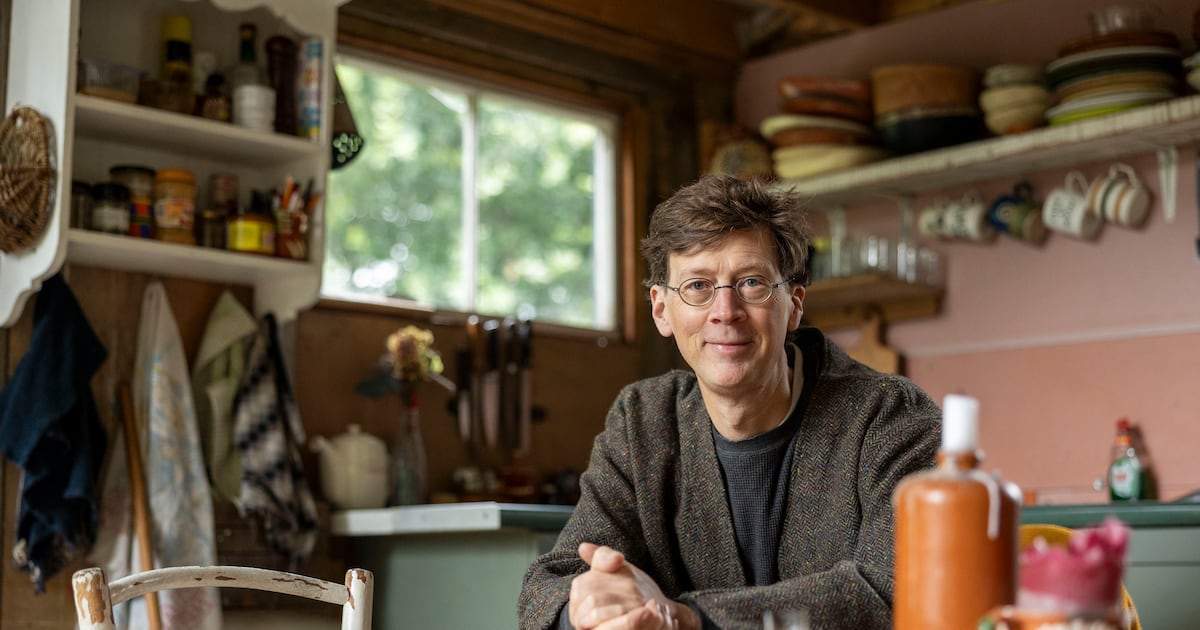Politics
Ireland Mourns the Loss of Influential Writer Manchán Magan

The literary and cultural landscape of Ireland has been profoundly affected by the passing of Manchán Magan, a celebrated writer, teacher, and broadcaster known for his deep exploration of the Irish language and its connection to spirituality and nature. Magan’s diverse body of work spanned travel journalism, documentaries, and literature, culminating in a significant legacy that will resonate for years to come.
Born in Dublin and raised in Donnybrook, Magan’s love for the Irish language blossomed during summers spent in west Kerry with his grandmother, Sighle Humphreys. His landmark book, Thirty-Two Words for Field, published during the pandemic in 2020, illustrated his approach to language as a means of connecting with the rich tapestry of Irish landscape, mythology, and spirituality. The book opens with a vivid passage that captures his grandmother’s teachings, showcasing the intricate vocabulary of the Irish language.
Magan’s heritage was as influential as his work. He was the great-grandnephew of The O’Rahilly, a key figure in the Irish republican movement, and a descendant of Aodhagán Ó Rathaille, the last Gaelic poet to have attended the ancient bardic schools of Killarney. This background deeply informed his artistic endeavors.
A prolific storyteller, Magan contributed to various platforms, including RTÉ and The Irish Times. He hosted the podcast Almanac of Ireland and produced multiple travel documentaries that showcased his fascination with native cultures and the environment. His projects ranged from explorations of Irish native trees to the Guanche culture of Tenerife, and he even embarked on a unique journey around Ireland without speaking English in the documentary No Béarla.
In recent years, Magan embraced sustainability, choosing to travel by train and prioritizing slow travel experiences. He shared these values in the upcoming series Manchán’s Europe By Train, set to air in 2024.
A Legacy of Creativity and Connection
Magan’s personality was a blend of sociability and introspection. He built his own straw bale home in Westmeath, where he raised pigs, hens, and bees, reflecting his commitment to a sustainable lifestyle. In a poignant interview with Brendan O’Connor on RTÉ Radio 1, he discussed his battle with prostate cancer, expressing a fearlessness towards death and a belief in the continuity of his work beyond this life.
He also co-founded Scoil Scairte, an online school aimed at exploring the Irish language through creative and spiritual lenses. His dedication to preserving indigenous knowledge was evident in his efforts to gather disappearing shoreline words from the Irish coast.
Magan’s impact extended beyond literature to live performances, such as Arán & Im, where he captivated audiences with his insights into the Irish language while baking bread. His unique projects, like Gaeilge Tamogochi, attracted small but devoted audiences, showcasing his innovative approach to language.
Embracing the Joy of Language
A track by the rap group Kneecap, titled “Drug Dealin’ Pagans,” features a voice note from Magan that encapsulates his enthusiasm for the Irish language. “You don’t know what’s going on. Nobody knows what’s going on!” This exuberance reflected his joy in witnessing young people embrace the language in vibrant new ways.
Magan’s friends, family, and colleagues are left to grapple with the loss of a luminous presence in their lives. His kindness and willingness to share knowledge were hallmarks of his character. As a board member of the native woodland charity Hometree and an ambassador for The Rivers Trust, he contributed to numerous environmental initiatives.
In a fitting tribute, heavy rains fell across Ireland on the morning following his death, reminiscent of the sorrow felt after the passing of fellow artist Sinéad O’Connor, to whom Magan dedicated his book Focail na mBan (Women’s Words). He recently published Ninety-nine Words for Rain (and One for Sun), further exploring the depth of Irish vocabulary and its connection to nature.
Molly King from Dingle’s Other Voices captured Magan’s essence perfectly: “He described the language as potent and infinite, but that was him too.” As tributes continue to pour in, the indelible mark left by Manchán Magan on Irish culture and language will not soon be forgotten.
-

 Top Stories3 months ago
Top Stories3 months agoTributes Surge for 9-Year-Old Leon Briody After Cancer Battle
-

 Entertainment4 months ago
Entertainment4 months agoAimee Osbourne Joins Family for Emotional Tribute to Ozzy
-

 Politics4 months ago
Politics4 months agoDanny Healy-Rae Considers Complaint After Altercation with Garda
-

 Top Stories4 months ago
Top Stories4 months agoIreland Enjoys Summer Heat as Hurricane Erin Approaches Atlantic
-

 World5 months ago
World5 months agoHawaii Commemorates 80 Years Since Hiroshima Bombing with Ceremony
-

 Top Stories3 months ago
Top Stories3 months agoNewcastle West Woman Patricia Foley Found Safe After Urgent Search
-

 Top Stories5 months ago
Top Stories5 months agoFianna Fáil TDs Urgently Consider Maire Geoghegan-Quinn for Presidency
-

 World5 months ago
World5 months agoCouple Convicted of Murdering Two-Year-Old Grandson in Wales
-

 World5 months ago
World5 months agoGaza Aid Distribution Tragedy: 20 Killed Amid Ongoing Violence
-

 World5 months ago
World5 months agoAristocrat Constance Marten and Partner Convicted of Infant Murder
-

 Top Stories4 months ago
Top Stories4 months agoClimbing Errigal: A Must-Do Summer Adventure in Donegal
-

 Top Stories4 months ago
Top Stories4 months agoHike Donegal’s Errigal Mountain NOW for Unforgettable Summer Views









